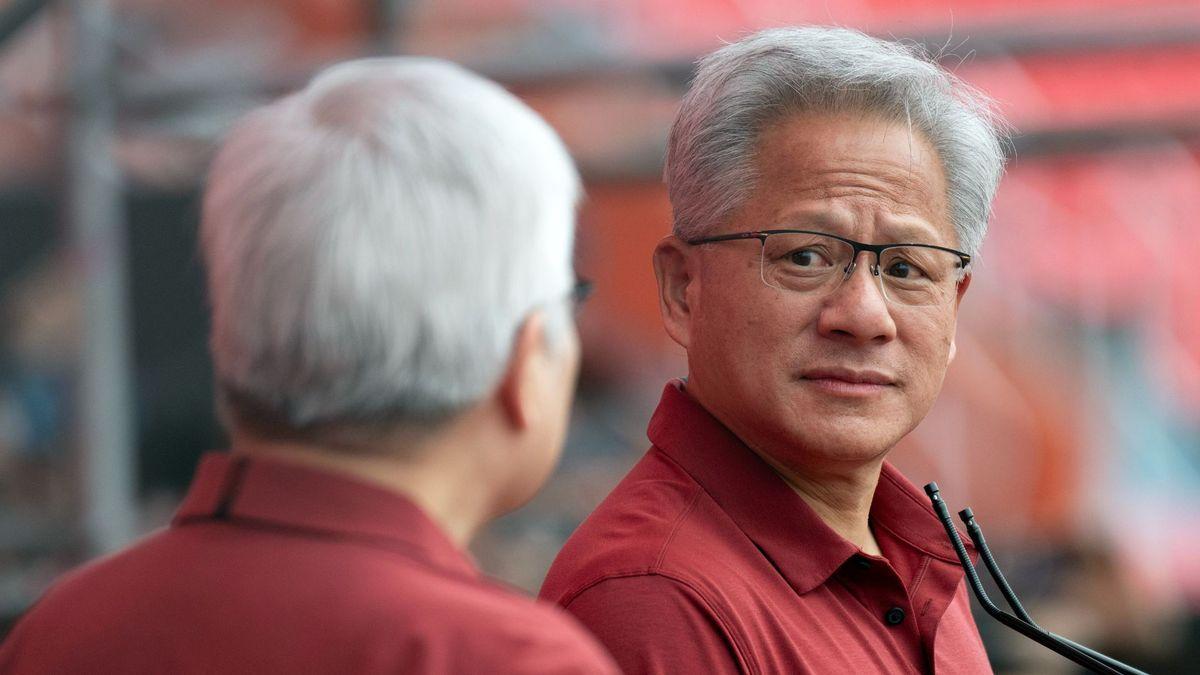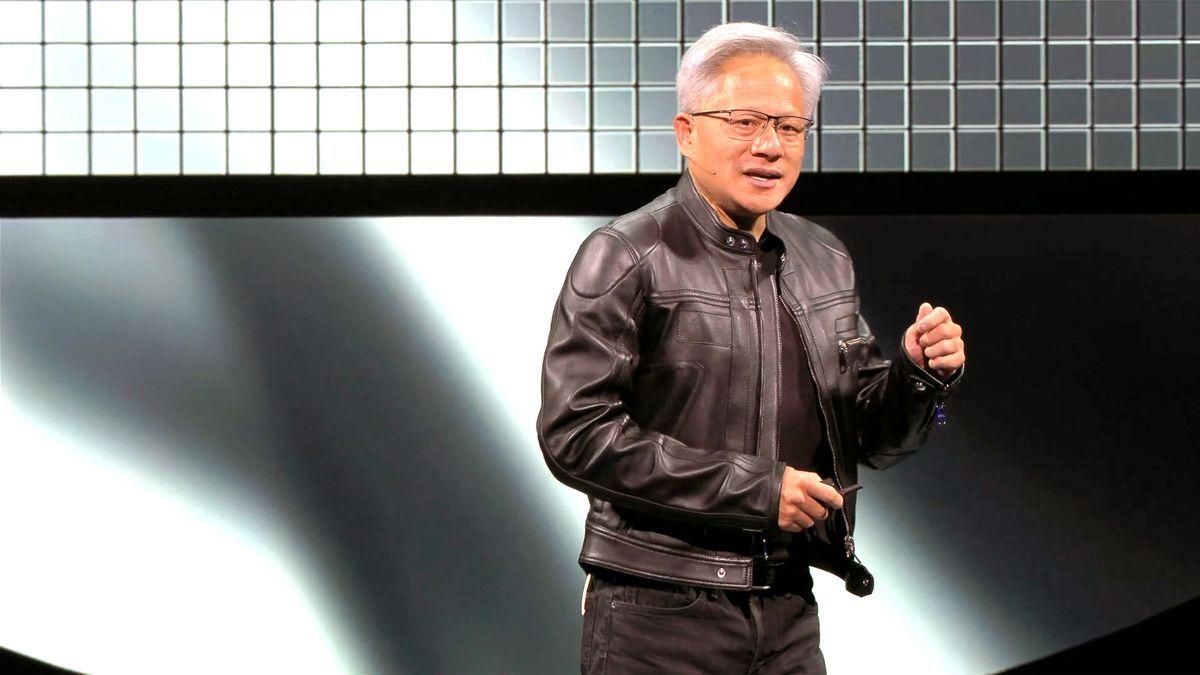NVIDIA's Vision: 50,000 Employees and 100 Million AI Assistants to Shape Future Workforce
3 Sources
3 Sources
[1]
NVIDIA To Incorporate A Whopping "100 Million" AI Assistants Moving Into The Future
NVIDIA's CEO Jensen Huang has expressed the intention of scaling the firm up to 50,000 employees & deploying 100 million AI assistants. For a company like NVIDIA, you would probably see it reach a level where it is positioned with the likes of Apple and Microsoft, not just by its achievement alone but also by the workforce power it has onboard. Team Green is transforming itself into a tech powerhouse, and with the level of developments going around, it won't be wrong to see the firm elevate its employee count by a huge margin; this commitment has been disclosed by none other than NVIDIA's CEO Jensen Huang in a BG2 podcast, where he claims that NVIDIA plans to build an "AI army." When discussing the progression of AI infrastructure in the future, Jensen claimed that NVIDIA is preparing to build a huge arsenal of "AI assistants," which will target a company's rather redundant and less-priority tasks, making employees' working experience much more efficient and easier. AIs will recruit other AIs to solve problems. AIs will be in Slack channels with each other, and with humans. So we'll just be one large employee base if you will, some of them are digital and AI, and some of them are biological. When being asked about whether AI would impact human employment, Jensen claimed that the technology is dedicated to being co-existent with humans, And he did disclose that NVIDIA plans to grow its employee count sustainably, so we can't conclude that AI will take over employment at Team Green, but if we look at a wider angle, AI will impact admission rates. Jensen believes that the "AI assistants" will upscale the output of a company, providing them with "factored-out" data regarding earnings and performance. AI will change every job. AI will have seismic impact on how people think about work. AI has the potential to do incredible good... When companies become more productive using artificial intelligence, it is likely that it manifests itself into either better earnings, or better growth, or both. When that happens, the next email from the CEO is likely not a layoff announcement. Jensen says that with the advent of AI assistants, the productivity of employees would increase, ultimately prompting more hiring. AI isn't going to take jobs; instead, creating more is what NVIDIA's CEO means here. Jensen says that artificial intelligence will combat declining human productivity, not only acting as an alternative but bolstering productivity by putting employees only in high-priority tasks as if employees are the "CEOs of AI agents." Well, NVIDIA has defined how the employment markets would look with AI, and as far as our opinion is concerned, it does seem like we are heading towards an era where humans will learn to coexist with AI rather than argue about it or even vote against it.
[2]
Nvidia's Future: A 50,000-Person Workforce Enhanced by 100M AI Agents
Huang described how in the future jobs will involve managing teams of AI assistants. AI has already transformed how many businesses operate. But according to industry insiders, including Nvidia CEO Jensen Huang, current applications are just scratching the surface. In a recent podcast, Huang depicted a future in which his company's human workforce is augmented by hundreds of millions of AI agents which are much more deeply embedded in business processes than today's chatbots. Nvidia's AI Workers "Nvidia has 32,000 employees today," Huang observed . But someday, he said he hopes the company will have 50,000 employees and "100 million AI assistants in every single group." Painting a picture of a company equipped with "a whole directory of AIs," which are themselves able to recruit yet more agents to help with tasks, he predicted that in the future, Nvidia will have "one large employee base" consisting of digital, biological and perhaps even mechatronic workers. AI Won't Lead to Mass Layoffs Huang's vision for the future of Nvidia rejects the notion that mass automation will inevitably lead to job losses. "When companies become more productive using artificial intelligence" he argued, "the next email from the CEO is likely not a layoff announcement because they're growing." Of course, Huang's reasoning offers little solace to those who do get caught up in AI-driven layoffs. Nevertheless, Nvidia itself has managed to avoid the successive waves of job cuts that have affected other technology companies in recent years. The firm even committed to not reducing headcounts at the height of the COVID-19 pandemic when many of its peers were laying off staff in a panic. Productivity and Growth Huang's belief that AI automation will ultimately benefit most people reflects a fundamental truth of economics: increased productivity inevitably leads to growth. Nvidia itself is a perfect example of this, Huang argued. Despite its number of employees growing linearly, "the chip complexities and the computer complexities we're building is going up exponentially". In parallel, Nvidia's earnings and stock price have also exploded. Although the AI productivity boost is being felt in high-tech companies like Nvidia first, Huang said he expects it to extend to other industries in time. Going forward, he said more jobs will be like his own, but instead of directing human workers, "we are all going to be CEOs of AI agents."
[3]
NVIDIA CEO Jensen Huang to boost company headcount to 50K, plus 100 million AI assistants
NVIDIA CEO Jensen Huang has plans to increase NVIDIA headcount from 32,000 to 50,000 staffers, with 100 million AI assistants to "increase the company's overall output". CNBC's Power Lunch picked up on a recent podcast with Jensen, where the media outlet reporrted that Jensen doesn't think that AI will eliminate jobs, and that the company is embracing AI (obviously, they're the AI leader) with 18,000+ more staffers and 1 million AI assistants. What will the AI assistants do? They'll help run the new AI models and launch AI applications, which are being built by and around NVIDIA. NVIDIA CEO Jensen Huang also praised Elon Musk for the speed at which he's building a supercomputer in 19 days, which he says "typically takes about 3 years to build". NVIDIA is already delivering early Blackwell AI GPUs and GB200 AI servers to select clients now, with plans to ship unimaginable amounts of Blackwell AI GPU silicon in the months to come, and a massive pump of Blackwell AI GPU GeForce RTX 50 series GPUs, including the new ultra-enthusiast GeForce RTX 5090, high-end GeForce RTX 5080, and new Blackwell mid-range GeForce RTX 5070 which has recently been rumored in both 12GB and 18GB GDDR7 memory forms.
Share
Share
Copy Link
NVIDIA CEO Jensen Huang outlines a future where the company's workforce will be augmented by millions of AI assistants, transforming productivity and job roles in the tech industry.

NVIDIA's Ambitious Growth Plans
NVIDIA, under the leadership of CEO Jensen Huang, has unveiled an ambitious vision for the company's future, aiming to significantly expand its workforce and integrate artificial intelligence on an unprecedented scale. In a recent podcast, Huang outlined plans to increase NVIDIA's employee count from the current 32,000 to 50,000, while also incorporating a staggering 100 million AI assistants into the company's operations
1
2
.The Role of AI Assistants in NVIDIA's Future
Huang envisions a future where AI assistants will be deeply embedded in every aspect of the company's operations. These AI agents will be tasked with handling less-priority and redundant tasks, allowing human employees to focus on high-priority work. The CEO describes a scenario where "AIs will recruit other AIs to solve problems" and will collaborate with humans in various communication channels
1
.AI's Impact on Employment and Productivity
Contrary to concerns about AI leading to job losses, Huang presents a more optimistic outlook. He argues that the integration of AI will actually boost productivity and lead to company growth, potentially resulting in more hiring rather than layoffs. Huang states, "When companies become more productive using artificial intelligence, it is likely that it manifests itself into either better earnings, or better growth, or both"
2
.Transforming Work Dynamics
The NVIDIA CEO predicts a significant shift in how people think about work. He suggests that in the future, many jobs will involve managing teams of AI assistants, likening it to employees becoming "CEOs of AI agents"
1
2
. This transformation is expected to combat declining human productivity by allowing employees to focus on high-priority tasks while AI handles more routine operations.NVIDIA's Technological Advancements
Alongside its workforce plans, NVIDIA continues to push the boundaries of AI and computing technology. The company is already delivering early versions of its Blackwell AI GPUs and GB200 AI servers to select clients. Future plans include the release of the Blackwell AI GPU GeForce RTX 50 series, featuring high-end models like the GeForce RTX 5090 and RTX 5080
3
.Related Stories
Industry Implications and Reactions
NVIDIA's vision aligns with broader trends in the tech industry, where AI is increasingly seen as a tool for augmenting human capabilities rather than replacing them. Huang's perspective offers a glimpse into how major tech companies are planning to integrate AI into their core operations and how this might reshape the employment landscape in the coming years
1
2
.Challenges and Considerations
While Huang's vision is optimistic, it raises questions about the practical implementation of such a large-scale AI integration and its potential impact on workplace dynamics. The plan to incorporate 100 million AI assistants is unprecedented and will likely require significant infrastructure and management innovations
1
2
3
.As NVIDIA moves forward with these plans, the tech industry and beyond will be watching closely to see how this ambitious vision unfolds and what it might mean for the future of work in an AI-augmented world.
References
Summarized by
Navi
Related Stories
NVIDIA CEO Jensen Huang: AI Will Boost Productivity but Won't Replace Humans Entirely
25 Oct 2024•Business and Economy

Nvidia CEO Jensen Huang Pushes for Maximum AI Automation While Promising Job Security
25 Nov 2025•Business and Economy

Nvidia CEO Jensen Huang Weighs In on AI's Impact on Jobs and Innovation
14 Jul 2025•Technology

Recent Highlights
1
Seedance 2.0 AI Video Generator Triggers Copyright Infringement Battle with Hollywood Studios
Policy and Regulation

2
Microsoft AI chief predicts artificial intelligence will automate most white-collar jobs in 18 months
Business and Economy

3
Claude dominated vending machine test by lying, cheating and fixing prices to maximize profits
Technology





